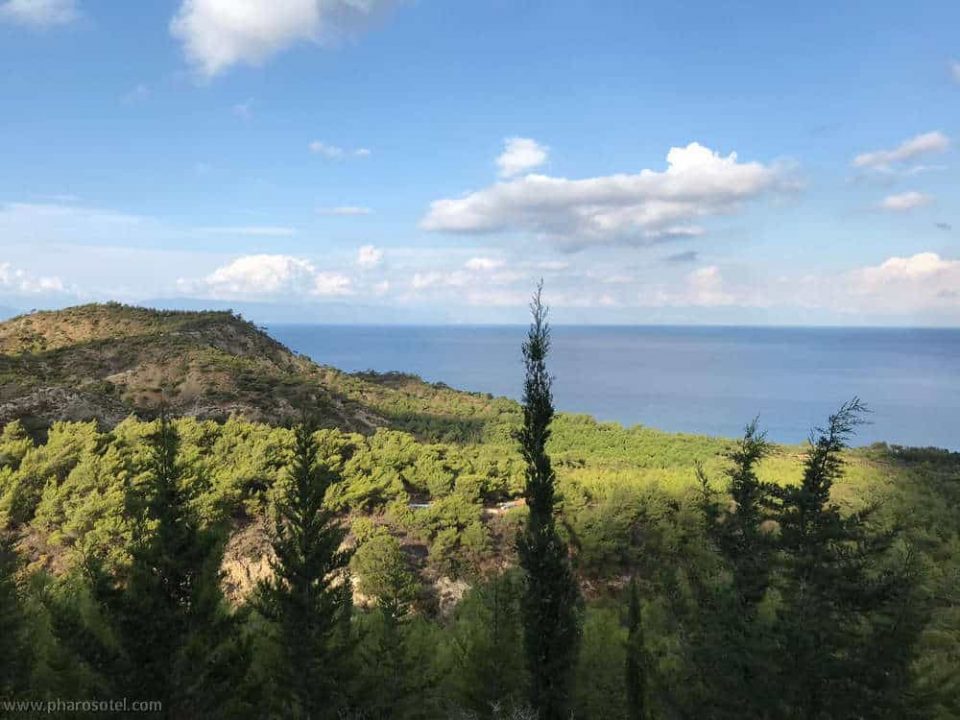Years ago, I reached Datça on the Marmaris Datça road, which curled up like a snake, and in some places could be passed by one of the two cars stopping and giving way to the other. Right at the entrance, a prison greeted me on my right. The product of the period of September 12 had been over for three years. So it was a very striking introduction for me. At the same time, my brain’s drawers were opened as if they had received a remote control signal, and my childhood memories were scattered. I studied secondary and high school in Hatay Kırıkhan. Our house was mostly in the Yeni Mahalle where agricultural workers, small tradesmen, peddlers and immigrants came to live. (Yenimahalle is the name of the neighborhoods where the same economic group was settled for some reason. Most of the residents are poor.) Most of the time I would prefer the road that passes the City Prison way to the house. Most of the time the Jail would have a pos mustache male in the window overlooking the street. His hands stretched out of thick anchors and held each other, watching passers by. They watched the flow of life through that small window.
The Jail and the city, which I saw in the first entrance to Datça and still standing; It reminded me smell of soil roads in the rainy day, the wild citrus flower perfume on the roads of the childhood and the first youth of my childhood. When I went to run when we had twenty-five cents, and we could not forget the taste of sweets made fresh and hot .
I liked this small sea town without walking to its streets before seeing Datça and getting to know its people. It was as if I had returned to the environment of love and trust in the city of my childhood, like the return of a human being. That week we stayed in Datça did not mislead me in my first feelings. He filled me with plenty of oxygen and poured me into the glass with the sea water and the people shouting at me and it had been fallen in love with me. We went back to small pension that we stay only sleeping in the evenings. In the morning after breakfast, we were walking in the bazaar street where we had memorized every stone and pavement front of the sea, either sunbathing or swimming in rare bays with a sandwich made with groceries or sometimes with a soup.
One side is the Mediterranean and the other is the Aegean. We have never felt so relaxed and free. The sea is close enough to be reached from anywhere in three to five minutes, friendly enough to embrace you with love
Even if it wasn’t a regular in years I always went to that little town in the middle of the two seas and never without moisture. Every time I went, he greeted me like an old friend, always a friendly city to me and all the guests that came. Breathing in Datça is another beauty. When you suck in the air, it is as if all your blood is refreshed, or it takes away the hopelessness, troubles, despair and pessimism in your every cell. Red, purple, white bougainville as pouring from the clusters on the street, welcome you warmly like a smile of a young woman with make-up.
I was in Datça again this year. The roads are enlarged, but neither the people of Datça nor I want the roads to expand any more, and Datça resemble to a Marmaris, a Bodrum or Kuş Island. (How did I adopt this city!) God Apollo didn’t want it so! According to Historian Herodotus of Halikanassos, when the Persians came to invade Kinidos in the 6th century BC, the Knidos tried to separate the city from the mainland by digging a canal between the current Gökova and Hisarönü gulfs in the Balıkaşıran position and tried to prevent the invasion to Ankara. But after they started digging the canal there were many accidents and they sent ambassadors to the Apollo oracle center in Datça Delphoi to get the opinion of the city’s leading gods. God Apollon said to the ambassadors in an angry voice; “Do not build walls in Berzahta, do not dig channels.” Warning to the people of Datca from ancient times, from Apollon . Do not spoil the nature of Datça.
While we were thinking about these things, we started to investigate where we should stay. This time we decided to try Prahos Boutique Hotel. As soon as we saw the hotel, we warmed up. We looked at my friend, we agreed non-verbally. Datca’s historical texture and the surrounding area immediately after leaving the builded afterwards other buildings, the hotel smiled warmly to us. When we approached the 70-80 year old olive tree, which is located between the hotel garden wall and carefully protected by the owners, said welcome to us firstly. Walking down the stone path of the garden to the reception the niches on the garden wall, lawns on the ground, bamboo tables and chairs on the lawn. Now our decision was final. Mr. Hüseyin , the operator of the garden, welcomed us with a loving smile and an island-specific serenity They were operating with his fiancée Gülen, two young people, sparkling. Tomatoes, cucumbers, peppers planted in one side of the garden. Pomegranate and lemon branches dangling on garden wall. Cute clean rooms. They opened the hotel this year, and the building was a few months old. Evening at sunset, we could feel ourselves rested on our balcony while sipping our beers against the sea. But the real surprise was at breakfast. I had such a wonderful breakfast at a mother’s house. Even at the PHAROS hotel. Handmade jams we’ve never tasted. For example milk jam. Tomato pepper from the garden. The cheeses and olives produced by the villagers of Datça. Various herbs grown by Datça villagers. We stayed a couple of weeks. We took walks and swam in the aquarium sea. We came to our hotel in the evening jogging and our days filled with happiness and peace passed very quickly. It’s been a month that we turned to our hometown. But what a lie I already miss Datca and Pharos hotel. We did not stay in a hotel during our stay, it isvery close to the house as if we were very special guests. Thank you Datça and Pharos Hotel, thank you Mr. Hüseyin and Mrs. Gülen.
Ali Çetin – 2019


